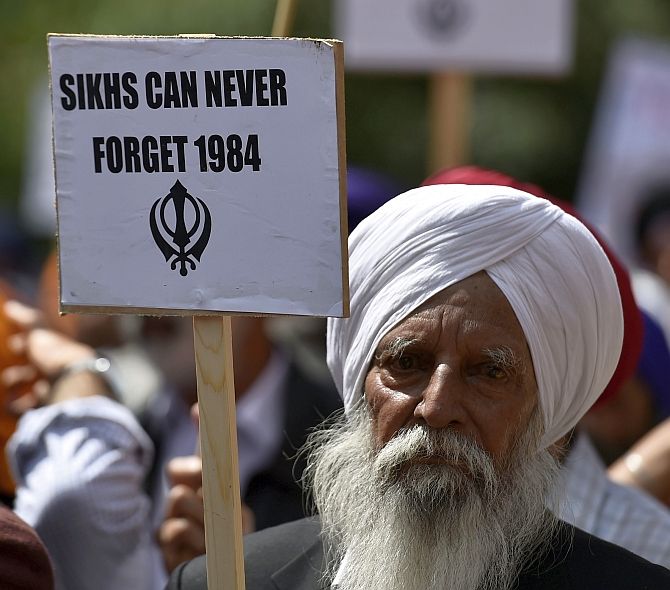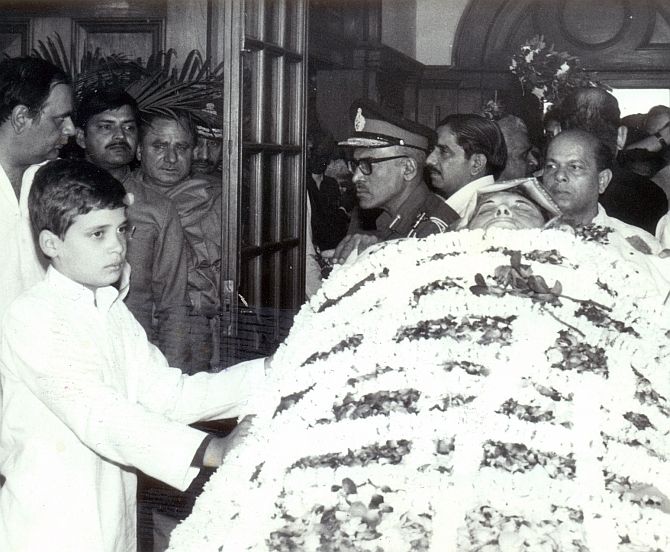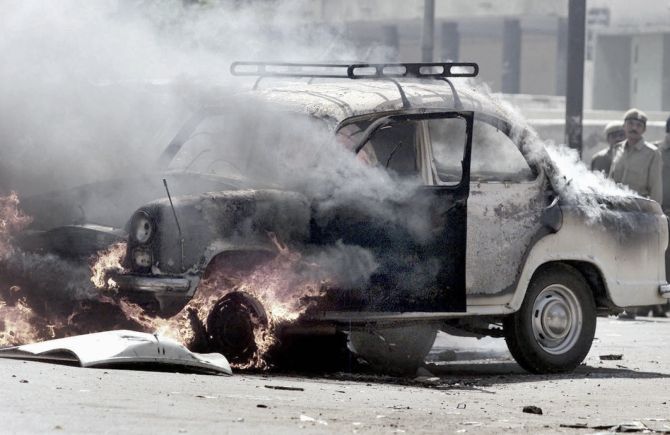Jasmit Singh, 85, recalls a horrific train journey to New Delhi on the day Indira Gandhi was killed.
He and his family were saved only because of the kindness of strangers.
Payal Mohanka reports.

Delhi alone accounted for 2,733 deaths while the rest occurred in Uttar Pradesh, Haryana, Madhya Pradesh, Maharashtra and other states.
Photograph: Toby Melville/Reuters
It was his darkest hour.
But he was one of the fortunate few who lived to tell the tale.
Today 85-year-old Jasmit Singh has moved on like other members of an inherently strong and resilient community.
With an abiding faith in a secular India, the Sikh community has tried to put the past behind it.
But 32 years later, those who got a second lease of life still wait for the guilty to be punished.
Sikhs, a community known for their courage and patriotism, were butchered like cattle while women wept and children trembled with fear.
This carnage was not a spontaneous outpouring of grief. It had the support of a paralysed administration. There was no political will to douse the raging flames.
Ahead of the Punjab assembly elections, the Special Investigation Team set up by the Union ministry of home affairs has been given another extension, this time till February 2017 to complete the re-investigation into the 1984 Sikh massacre.
Over ten commissions and committees later, justice still eludes the community.
Those horrific memories are buried deep in the recesses of Jasmit Singh's mind.
Sadly, each year as October 31 creeps close, memories of that encounter with brutality in 1984 swamp him.
While his friends in Delhi relived the horrors of Partition as their homes were set ablaze, he is haunted by the terror of a train journey in independent India.
He was one of a group of 20 Sikhs on their way to Delhi for a wedding on that fateful day.
When they boarded the deluxe from Calcutta's Howrah Station to Delhi on October 31, 1984, they never imagined the horrors that awaited them.

It was at 12:30 pm when the group first heard that then prime minister Indira Gandhi had been shot by her bodyguards and was in hospital.
Singh's instant reaction was one of disbelief. The confirmed news of Indira Gandhi's tragic assassination reached the group over the radio at about 6:30 pm.
And it was only then that he learnt that the two assassins were Sikhs.
Every passenger irrespective of her or his religion was in a state of shocked silence. But not one had anticipated the disaster that awaited them at Ghaziabad.
The train reached Ghaziabad, two hours from Delhi, at 11 am the next day.
That was the beginning of two harrowing hours, when the entire wedding group was suspended between life and death.
A bloodthirsty mob, like a pack of hungry wolves hunting for prey, went from coach to coach in search of Sikhs.
There was madness in their eyes and murder etched across their faces.
Menacing cries of "Koi Sardar hai? Goli se maar dalenge" followed.
In a frenzy of madness, the mob, armed with iron rods and knives, brutally dragged out Sikhs, burnt their turbans, hacked them to death and threw them across the tracks.
Even the old and feeble were not spared.
The barbaric mob, totally devoid of rationality, declared that women would be spared.
But in what sense were they 'spared'?
"What can be more torturous for women than seeing male members of their family brutally killed in front of their eyes?" remembers Singh.
The only Sikhs who were spared were the six with the wedding group.
And the credit goes to the innate goodness of the passengers in their coach.
Before the train even halted at Ghaziabad, the hysterical mob had caught a glimpse of the six turbaned Sikhs.
A fusillade of stones followed and the glass windows were smashed to bits.
Shutters were hastily pulled down for protection.
The police could not control the wild mob and found it easier to turn their backs and walk away.
The other passengers in the coach, realising there was more trouble ahead, suggested that the Sikhs occupy the ladies' compartment in the coach.
At first, the Sikhs were reluctant, but they were literally forced in.
It was ironic.
Sikhs, who were historically known for their valour, now had to protect themselves by hiding in a ladies' compartment or else become victims of a murderous horde.
Jasmit Singh's wife and the mother of the bride-to-be were also pushed into the ladies' compartment so that they could answer if any questions were asked.

The main doors of the coach were locked from inside.
The mob, bent on destruction, was not to be deterred. They pounded on the heavy metal door for over 15 minutes.
The incessant hammering was accompanied by threats to set the train on fire.
One non-Sikh passenger shifted uncomfortably in his seat and felt that all of them would lose their lives if the door was not opened. But he was sternly reprimanded by the others who forcefully announced that under no circumstances would the door be opened.
Finally the mob broke open the door. Their violent mutilation of the train had only whetted their appetite for more destruction.
The savage mob stormed into the coach and walked past the ladies' compartment. But even before the wedding group could sigh with relief, they turned around and angrily demanded that the door of the ladies' compartment be opened, so that they could check for themselves.
By now nerves had reached breaking point. But members of the wedding group could not lose their composure lest they suspect that something was amiss.
Efforts to convince the mob that there were just panic-stricken women inside were in vain. The mob was adamant. They began to bang on the door. They seemed to grow suspicious at the sight of a large number of women outside the ladies' compartment and asked the other passengers, "Are these women travelling alone?"
A middle-aged Hindu replied, "No, they are with us."
The petrified screams of the two ladies from inside, the pleas and persuasion of the other passengers finally seemed to convince the mob that there were no Sikhs inside. They retreated.
After two hours of excruciating agony, the wedding group could almost collapse with sheer relief.
The situation was grim in Delhi. No security arrangements had been made at the station. While the ladies in the wedding group left the station at 3 pm, the men, who were the only ones on the train to survive the massacre, waited at the station.
They removed dead bodies from the train and assisted the injured. By 8 pm arrangements had been made by friends and relatives to ferry them safely out of the station.
Bodies of Sikhs with blood streaming down their faces were unloaded from the train in which the group had travelled.
Brutally battered bodies of Sikhs reached Delhi from other incoming trains as well.
Innocent people who had done nothing. Except for being Sikhs and travelling to Delhi on that fateful day.
1984 remains an ugly stain on the history of Independent India. And the community still awaits justice.










 © 2025 Rediff.com -
© 2025 Rediff.com -